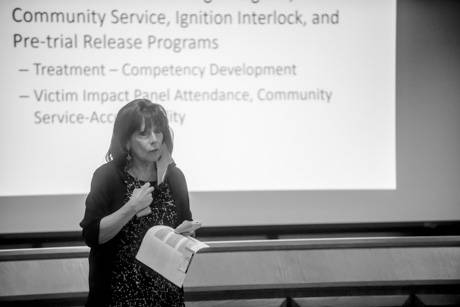
The third meeting of the Batavia's Police Collaboration Advisory Stakeholder Group covered several topics related to the local criminal justice system, including:
- Restorative Justice/Genesee Justice;
- Implicit bias training;
- The juvenile diversion program;
- Procedural justice -- standards of conduct, community relations, and biases in policing.
Cathy Uhly, program coordinator for Genesee Justice (top photo), spoke about restorative justice at the meeting on Thursday night at the City Centre Board Room.
In contrast to punitive justice, which doesn't take into account victims and ignores any possibility of rehabilitation, restorative justice gives an opportunity for crime victims to be heard so that criminals might better understand the impact of their actions as well potentially make amends or pay restitution. It also offers offenders an opportunity to reform and become productive members of society.
Genesee Justice was the first county-level restorative justice program in the nation, was started in 1980 by then-Sheriff Douglas Call, former probation officer Dennis Wittman, and former County Court Judge Glenn Morton.
Genesee Justice represents criminal victims, supervises accused criminal defendants prior to sentencing, manages DWI (driving while intoxicated) convicts going through the conditional discharge program, and conducts a judicial diversion program.
Julie Carasone, a certified trainer who will conduct an implicit bias seminar for Batavia police officers in December, gave a brief overview of the training course she will present.
Implicit bias is a bias a person might possess and be unaware of it. The course Carasone teaches involves exercises to help people learn both how biases affect their perceptions and judgments and the roots of such biases.
The course also touches on cognitive biases such as confirmation bias and the halo effect.
A confirmation bias is the tendency of people to seek out information that confirms what they already believe and dismisses information that contradicts their beliefs. The halo effect is attributing abilities or attributes to a person for no other reason than appearance, speech or past performance.
Her training also covers institutional, structural and historic racism.
Paula Campbell, an attorney in the County Attorney's Office who works in Family Court, spoke about current diversion programs designed to help young people from getting caught up in the justice system and learning to cope with any problems they might have.
Programs include PINS (person in need of supervision), youth court, family court, and programs for youths determined to be juvenile delinquents.
What program a youth enters depends on age, the severity of any behavioral issues of criminal conduct, and past record.
Anybody in the community can refer a youth to probation for consideration of possible intervention if that person has had harmed by a youth. Most commonly, referrals come from parents, schools or police.
In youth court, young people act as the judge, attorneys and jury to help deal with minor youthful offenses. It is the offender's peers who decide the best course of action to help correct a wrong or put youth on a more productive path.
Chief Shawn Heubusch spoke about police department policies that deal with procedural justice. These policies include standards of conduct, community relations, and bias in policing. These policies cover ethical behavior, building connections with community members, and avoiding prejudice in professional decision making.
